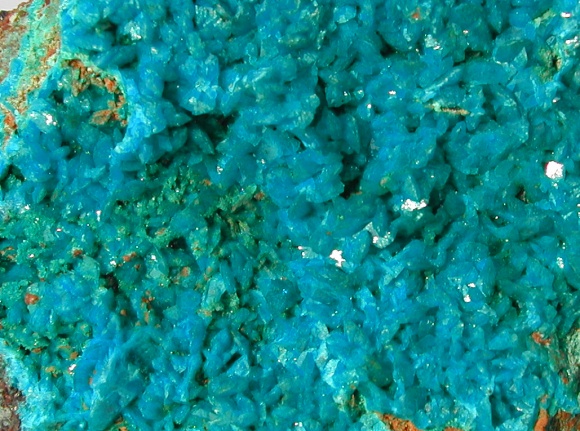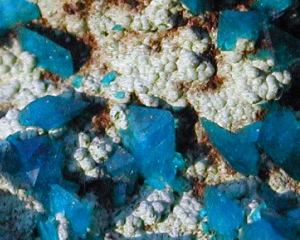|
|
 |
|
|
 |
 |
 |
 |
 |
|
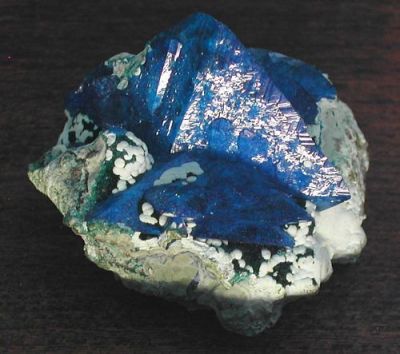 |
|
|
|
Liroconite - Wheal Gorland, Gwennap, Cornwall, UK
"Transparent Crystals of Copper Ore in double four sided Pyramids of a bright blue colour the largest crystal 9/10 of an Inch on one edge from Wheal Gorland r.r.r. (very
rare)" Rashleigh collection and description.
This specimen was added to the famous Rashleigh collection of minerals in 1808, and can be seen in the Royal Cornwall Museum in Truro, UK.
|
|
|
Liroconite colour is variable
The colour of the Liroconite varies from sky-blue to turquoise-blue through to verdigris-green, which may be related to minor differences in chemical composition. Its streak colour is much
paler as does its powdered form, as its name suggests. It is also sensitive and can occasionally fade to a bluish-white and exceptionally even disintegrate.
|
|
|
 |
 |
 |
 |
 |
|
Liroconite has a very unusual crystal shape
The chemical formula of Liroconite is Cu2Al[(OH)4/AsO4].4H20.
It forms pseudotetragonal to flat distorted pyramidal crystals. Crystals to two centimetres diameter and greater were found when Liroconite was first discovered in Cornwall (1780-1790). In 1808 the largest known crystal, reaching 3.5cm, was added to the famous Rashliegh collection. This can be seen today in the County museum of Cornwall in Truro in the UK, and is shown in the photo.
|
|
|
|
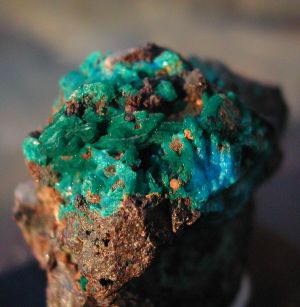 |
|
|
|
Liroconite - Wheal Gorland, Gwennap, Cornwall, UK
Liroconite crystals of a deep green colour, some with a sky blue core.
|
|
 |
|
|
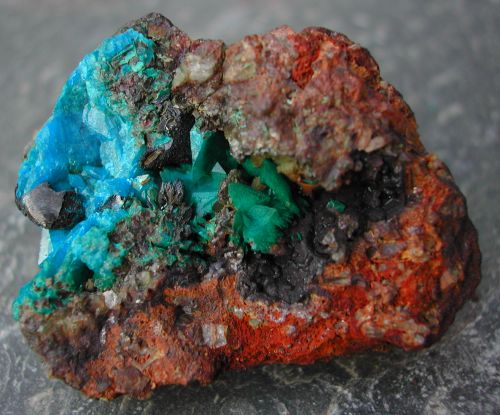 |
 |
 |
|
Liroconite and Clinoclase - Wheal Gorland, Gwennap, Cornwall, UK
An unusual specimen with both sky blue and green Liroconite crystals together with inky blue Clinoclase. Ex. Peter Golley collection.
|
 |
 |
|
Liroconite Crystal Habit
Liroconite crystals have an unusual shape, and are composed of the sides of a four faced prism, and four faces of two monoclinic domes.
They often appear to have an eight faced tetragonal bipyramidal form.
The old name of "lenses ore" refers to the typical elliptical shape, with crystals frequently appearing bent with rounded edges.
|
|
|
 |
 |
|
Liroconite Chemical Characteristics
|
 |
|
|
|
Chemical formula
|
Cu2Al(AsO4)(OH)4 - 4H2O
|
|
Chemistry
|
Hydrated Copper Aluminium Arsenate Hydroxide
|
|
Class
|
Phosphates
|
|
Subclass
|
Arsenates
|
|
Dana class
|
42.2.1.1
|
|
Strunz class
|
VII/D.20-40
|
|
Composition:
|
Aluminium 6.23%
|
|
|
Copper 29.35%
|
|
|
Arsenic 17.30%
|
|
|
Hydrogen 2.79%
|
|
|
Oxygen 44.33%
|
|
Chemical indicator
|
Does not react with acid
|
|
 |
 |
|
Liroconite Physical Characteristics
|
 |
|
|
|
Colour
|
Light blue to sky blue to blue-green to green
|
|
Streak
|
Pale blue (as its Greek name would suggest)
|
|
Lustre
|
Vitreous – resinous
|
|
Luminescence
|
None
|
|
Transparency
|
Transparent to translucent
|
|
Optical Data
|
Biaxial (-), a=1.612, b=1.652, g=1.675, bire=0.0630, 2V(Calc)=72, 2V(Meas)=67. Dispersion none.
|
|
Hardness
|
2 to 2.5
|
|
Specific Gravity
|
2.90 to 3.00, average 2.95
|
|
Crystal System
|
Monoclinic – Prismatic
|
|
Axial Ratios
|
a:b:c =1.6719:1:1.3064
|
|
Cell Dimensions
|
a = 12.665, b = 7.575, c = 9.896, Z = 4; beta = 91.25° V = 949.17 Den(Calc)= 3.03
|
|
X-Ray Diffraction
|
by Intensity(I/Io): 6.52(1), 6.03(0.8), 3.005(0.5),
|
|
Cleavage
|
Poor in two directions parallel to the prism faces. (100) Indistinct, (011) Indistinct.
|
|
Fracture
|
Uneven to sub-conchoidal, fractures are characterised by semi-curving surfaces.
|
|
Associated Minerals
|
Clinoclase, Olivenite, Parnuite, Strashimirite, Chalcopyllite, Malachite, Azurite, Cuprite
|
|
Best Field Indicators
|
Crystal habit, associated minerals, streak and colour
|
|
 |
 |
|
Copyright (C) 2003-2008 David Aubrey-Jones. All rights reserved. No part of this Web site and its contents may be reproduced in any form without the written permission of the author.
|
|


